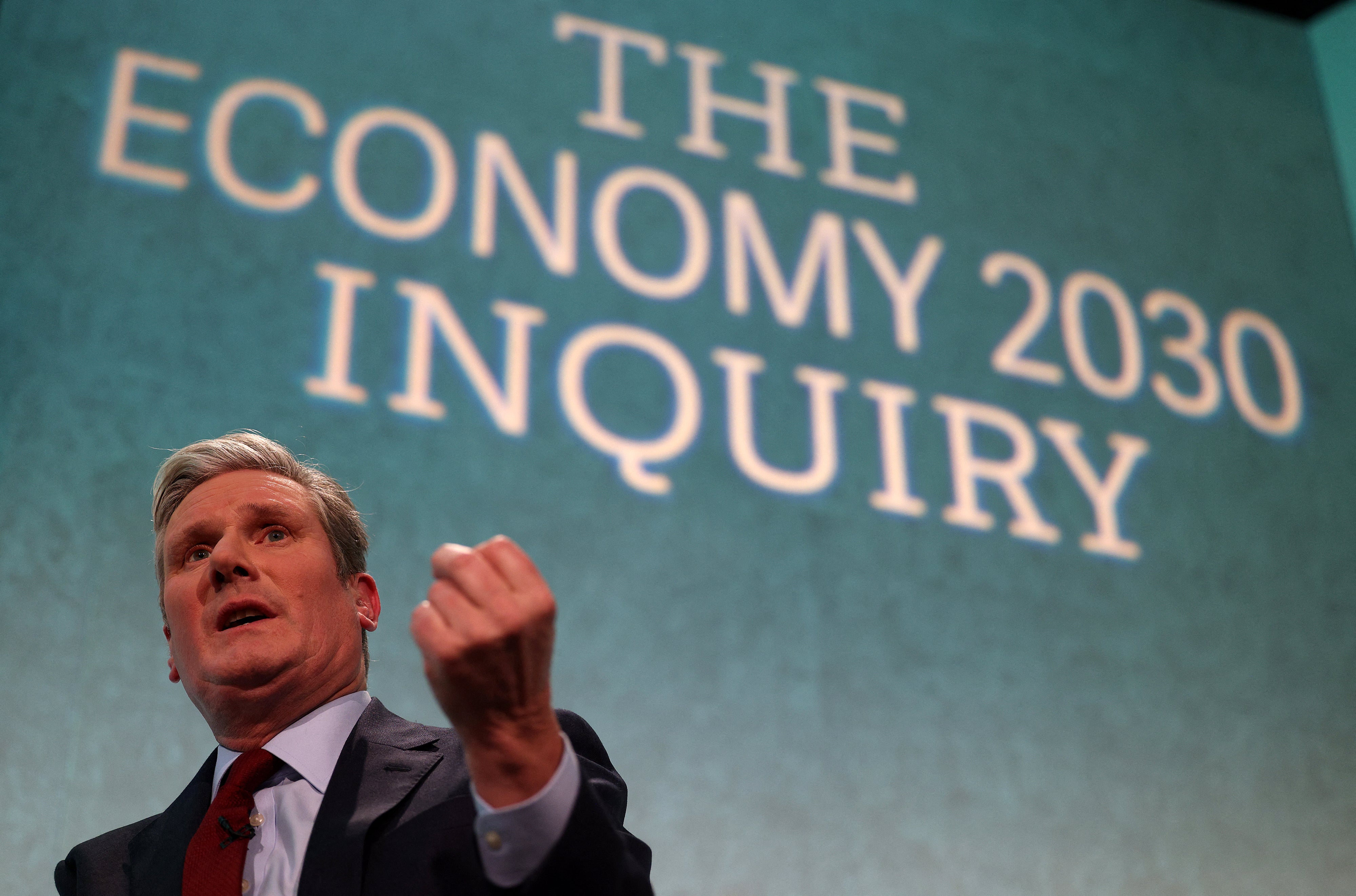What do we know about Labour’s tax and spending plans?
Keir Starmer is pinning his hopes on ‘securonomics’ – a dividend from an end to political chaos – as Andrew Grice explains

Sir Keir Starmer has warned that an incoming Labour government would face “huge constraints” and would not be able to “turn on the spending taps“. In a speech to the Resolution Foundation conference, the Labour leader gave us a glimpse of his thinking in his first detailed statement on the economy since last month’s autumn statement.
What do we know about Labour’s tax and spending plans?
Sir Keir said the Tories’ legacy would be much worse than the one they inherited from Labour in 2010, when outgoing Treasury minister Liam Byrne left a note to his successor saying: “I’m afraid there’s no money.” Debt and interest rates would be much higher than in 2010, he said, with growth stagnant. Economists have suggested Britain is stuck in a “doom loop” in which the highest tax burden for 70 years, with high debt-interest payments, does not result in better public services.
Why is Sir Keir playing down expectations of what Labour could do?
He knows Labour will have a rotten economic inheritance. Labour’s jitters have increased since Jeremy Hunt’s statement pencilled in £20bn of public spending cuts in the next few years by cutting national insurance contributions (NICs) instead of raising Whitehall budgets to account for inflation. Labour MPs fear a return to the austerity experienced under the Tory-led coalition in 2010-15. Answering questions after his speech, Sir Keir insisted he is “certainly not in the business of cutting the funding”, suggesting higher growth would allow Labour to avoid cuts. He contrasted the investment in public services under Labour governments with Tory “austerity”.
Economists have accused both the Tories and Labour of being “in denial” about the state of the public finances. Sir Keir is trying to be candid about the immense challenges his government would face – and perhaps to prepare the ground for an attempt to blame the Tories if voters think his administration is making little progress.
Would a Labour government be any different to Rishi Sunak’s administration?
Sir Keir insisted it would, saying: “We will make different choices.” He pointed to Labour’s pledge to end non-dom tax status, to cut NHS waiting lists and to impose VAT on private schools, with the money spent on “high-quality teaching and our children’s mental health”. But these would raise relatively small amounts. He hoped living standards would be rising within two years of a Labour government.
What would be Labour’s economic strategy?
The Labour leader said raising Britain’s productivity growth “will be an obsession”. He defined his approach as “securonomics”, modelled on the US president’s “Bidenomics”, offering security for workers and businesses from the impacts of tyrants and global headwinds. He said Labour would take “big steps” quickly to get growth going, such as removing blockages in the planning system that stop the country building homes, warehouses, train lines, grid connections, wind farms and laboratories. While Labour believes more housebuilding would drive growth, change would take time and there would be no magic wand.
Sir Keir said a Labour government would reform the public sector, exploiting the benefits of AI, and “be ruthless when it comes to spending every pound wisely”. However, the scope for efficiency savings is likely to prove limited.
Is Labour still committed to green growth?
Officially, the party retains its pledge to spend £28bn a year on a “green prosperity plan”, funded by borrowing. But it has already delayed reaching that figure until the second half of a five-year parliament. Some leading figures want a further dilution but Ed Miliband, the shadow climate change secretary, is resisting. The Tories argue that the pledge is incompatible with sticking to his – and Labour’s – fiscal rule to reduce government debt. Labour insists its “iron-clad fiscal discipline” will take priority.
Might a Labour government end up raising taxes?
Yes. Sir Keir and Rachel Reeves, the shadow chancellor, are wary of setting out tax rises before next year’s election, as this would allow the Tories to run their favourite campaign about “Labour’s tax bombshell”. Ms Reeves has ruled out a wealth tax and said Labour has no plans for further tax increases on top of what it has announced. Some Labour insiders had privately favoured a rise in NICs, which some voters regard as part of a contributory system rather than a tax. But that is off the agenda now that Labour has accepted Mr Hunt’s decision to cut the main rate of NICs by two percentage points from next month. One option for Labour would be to raise the higher rate on earnings above £50,268 a year, currently two per cent.
While Labour has no “hidden agenda” of planned tax rises, some party figures believe “looking at the books” on taking office will persuade an incoming government it has a small window to raise taxes to rescue public services – and try to blame it on their inheritance from the Tories.






Join our commenting forum
Join thought-provoking conversations, follow other Independent readers and see their replies
Comments